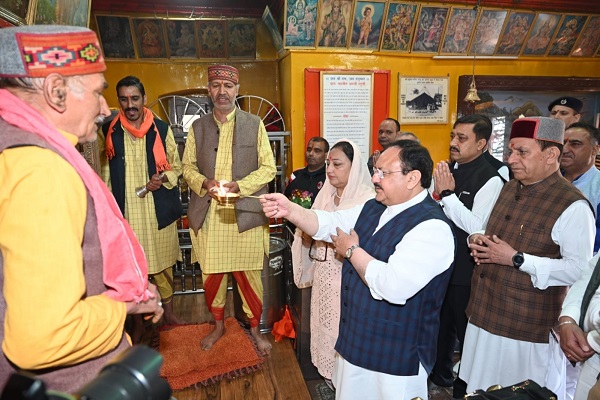Shimla, (Samajweekly) Setting aside speculations of the change in leadership just ahead of the assembly polls in Himachal Pradesh, BJP president JP Nadda on Sunday said Chief Minister Jai Ram Thakur would continue his full term, and the next election would be contested under his leadership.
Ruling out the possibility of change in guard in the state, Nadda’s assertions set aside claims of Delhi Deputy Chief Minister Manish Sisodia that Union minister Anurag Thakur would be replacing Thakur.
Nadda, who belongs to this state, told the media here that “there is no possibility of replacing Chief Minister Jai Ram Thakur. The BJP would go to the polls under the leadership of Jai Ram Thakur, the government is functioning well and in future too he will lead the government”.
Also, there is a possibility that tickets might be denied to some of the legislators due to anti-incumbency.
The 68-member assembly is likely to go the polls by year-end along with another BJP-ruled state Gujarat.
Patting the back of the Chief Minister, he was categorically clear in saying that the state government is performing well and there is no possibility of leadership change.
However, when asked if ticket could be denied to sitting MLAs, without mincing words Nadda said there was always a possibility and it would be determined by changing circumstances. “In any election, we do change 10-15 per cent of the total ticket.”
He said that tickets have been changed in Uttar Pradesh and Manipur assembly elections and in Himachal Pradesh too it can be done.
“I am fully satisfied and happy with the coordination between the party and the government,” said Nadda, ruling out the possibility of a Cabinet reshuffle.
The BJP national president said on the completion of four years tenure of the state government, Prime Minister Narendra Modi had laid foundation stones and dedicated projects worth Rs 11,500 crore for the state.
Nadda, who reached the state capital on Saturday, conducted a roadshow here along with along Anurag Thakur and Jai Ram Thakur and to prepare the roadmap for the Shimla Municipal Corporation and Assembly elections.
The BJP had won a majority in the 2017 Assembly polls with 44 seats in the 68-member state Assembly.
Jai Ram Thakur is the first Chief Minister from Mandi, the second biggest district of Himachal after Kangra. Earlier, Chief Ministers hailed from Shimla, Kangra and Sirmaur districts.
For Thakur, who believes development work and no witch hunting is the mantra for success, unprecedented development will remain the party’s main poll plank for this year’s polls to the 68-member Legislative Assembly.
In an interview with IANS on Saturday, Thakur despite the Covid-19 pandemic, the state borrowed less than the previous Congress government.
Also the global investor summit of 2019 has started yielding results. Besides, the state and the people are fortunate to have benevolence and affection of Prime Minister Narendra Modi, he added.
“As far as the impact of Covid-19 on the economy is concerned, you know it was a global pandemic. Despite this, we have made a rapid recovery. Himachal’s economic growth rate for fiscal 2022-23 is estimated at 8.3 per cent,” Thakur said.
On the major challenges before him in the first year of rule, Thakur candidly replied: “My government inherited a loan burden of over Rs 48,000 crore from the previous government due to unmindful expenditure and fiscal mismanagement.
“The first and the foremost task before our government after coming to power was to bring on track the derailed economy of the state. The previous government, in a desperate bid to woo the voters in its fag end of tenure, opened several colleges and institutions without making any budgetary provisions. The foremost task before my government was to make provision of budget for them.
“Also emotional integration was a major issue which needed to be redressed as the state was sharply divided on line of upper and lower Himachal and even on the colour of the caps.
“It is for the people to assess the success and results of the government and I am sure that the people of the state are wise enough to make their decision in the larger interest of the state.”










